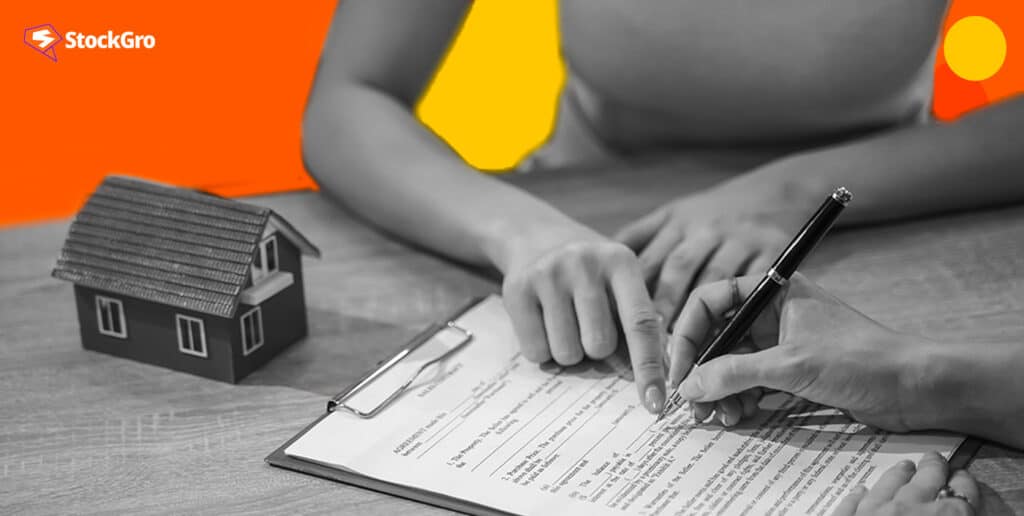
Introduction
Before you decide to rent a place, it’s really important to understand some key things you need to verify before signing a rent agreement. The rent agreement details show what you’re agreeing to when you sign the paper with the landlord. It is important to know about the lock-in period, which is how long you’re committed to staying there. Understanding what documents required for rent agreement are necessary.
This article is here to help you understand all these important points in simple terms. It’s all about making sure you’re clear about what you’re agreeing to before you sign anything.
What is rent agreement?
A rent agreement, also known as a lease agreement, is a legal document that outlines the rules and terms agreed upon by the property owner (landlord) and the tenant.
This agreement serves as a contract between both parties, detailing their respective rights and responsibilities during the rental period. Typically, a rent agreement is drafted by a real estate agent hired by either the landlord or the tenant to ensure clarity and legal compliance.
To validate the agreement, both the landlord and the tenant must sign it in the presence of two witnesses who are not beneficiaries of the property. These witnesses attest to the authenticity of the signatures and the agreement’s contents. In many cases, one of the witnesses is the real estate agent who facilitated the agreement.
Overall, a rent agreement acts as a formal agreement between the landlord and tenant, providing a framework for their rental relationship.
It outlines basic rent agreement details such as the duration of the tenancy, rent amount, security deposit, maintenance responsibilities, and any additional terms agreed upon by both parties. This document helps prevent misunderstandings and disputes by clearly defining the rights and obligations of each party involved in the rental arrangement.
Wondering how to check rent agreement online or how to get rental agreement online? Well, there are many online platforms that offer these services for free or with a minimum charge.
Also read: Real estate investing for beginners
Things to check before signing in rental agreement
Before signing a rental agreement, it’s important to thoroughly examine several key aspects to ensure a smooth and mutually beneficial rental experience.
From understanding the duration of the tenancy to clarifying the terms of renewal after the contract expires. Here’s a comprehensive guide on the things to check before signing a rental agreement:
1. Rent tenure
The rent tenure specifies the duration for which the property is being rented. Before signing the agreement, carefully review this section to ensure it aligns with your housing needs and plans. Consider whether the rental period meets your requirements, whether it’s a short-term lease or a longer-term commitment.
2. Rent amount
Verify the agreed-upon rent amount stated in the rental agreement. Ensure that it matches the amount discussed with the landlord or property manager. Double-check for any additional charges or fees included in the rent, such as utilities or maintenance costs. Clarify whether the rent amount is subject to change during the tenancy period.
3. Security amount
The security deposit serves as a form of protection for the landlord against potential damages or unpaid rent. Before signing the agreement, confirm the security amount required and understand the conditions for its refund upon lease termination. Ensure that the agreement specifies the circumstances under which deductions may be made from the security deposit.
4. Rent payment date
Review the rent payment date mentioned in the rental agreement. It’s essential to know when the rent is due each month to avoid any misunderstandings or late payments. If the due date falls on a weekend or holiday, clarify whether there are provisions for an alternative payment deadline.
5. Penalty payment for late rent
Check if there are any penalties or late fees imposed for delayed rent payments. Some rental agreements include provisions for penalty payments if the rent is not paid by the specified due date. Understand the consequences of late payments and ensure compliance with the terms to avoid additional charges.
6. Facilities for tenant
Examine the section detailing the facilities provided to tenants by the landlord. This may include amenities such as parking space, access to common areas, or utilities like water and electricity. Ensure that the agreement accurately reflects the facilities available and any associated costs or responsibilities.
Also read: Blue Aadhaar Card: Who is it for, and how should you apply?
7. Rent escalation clause
A rent escalation clause outlines the conditions under which the rent amount may increase during the tenancy period. Carefully review this clause to understand the circumstances that may lead to rent hikes, such as inflation or improvements made to the property. Determine whether there are limits or restrictions on the frequency and magnitude of rent increases.
8. Renewal terms
Consider the renewal terms specified in the rental agreement for clarity on extending the lease after its expiration. Understand the procedures and conditions for renewing the lease, including any notice periods or changes in rent terms. Clarify whether the renewal is automatic or requires mutual agreement between the landlord and tenant.
By reviewing these essential aspects of the rental agreement before signing, tenants can avoid misunderstandings and ensure a harmonious landlord-tenant relationship throughout the tenancy period.
Remember to seek clarification from the landlord or property manager on any unclear or ambiguous terms to make informed decisions regarding the rental arrangement.
Also read: ESG: A new formula for investing success
Conclusion
Before signing a rental agreement, it’s important to thoroughly understand the terms and conditions outlined in the document. By carefully reviewing key aspects, tenants can ensure a smooth and mutually beneficial rental experience.
Additionally, clarifying any uncertainties with the landlord or property manager is essential for clarity and peace of mind. By taking these steps, tenants can enter into the rental agreement confidently. If you want to learn more about financial concepts, subscribe to StockGro.
